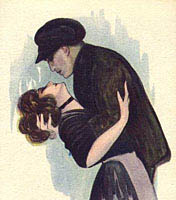Between 1710 and 1713 Jonathan Swift sent a number of letters to his friend Esther Johnson, whom he called “Stella,” and many years later the letters were collected and published as a Journal to Stella. On March 8, 1712, Swift asked Stella “Did I tell you of a race of Rakes calld the Mohacks that play the devil about this Town every Night, slit peoples noses, & beat them &c.” “Mohacks” or “Mohocks” (the spelling varies) were “aristocratic hooligans who allegedly roamed the streets of London by night in the early 18th cent. and were suspected of ruffianism.” Thus the OED, which led me to the Swift passage. Another spelling of the word, from 1829, “Mohawk,” indicates the derivation: the aristocratic hooligans were posing as Native American Mohawks (one of the allegedly warlike tribes of the Iroquois Confederacy), presumably in hopes of arrogating an exotic fierceness to themselves. Sometimes the hooligans were called “amucks,” in a confused blending of “Mohawk” and “amok” (see mataglap). However named, aristocratic hooligans seem vanished from our streets, but not so punk musicians or athletes or hipsters sporting a Mohawk haircut: another cultural arrogation, if you like.
As etymons for words in English, Native American tribes have rarely fared well. Besides the Mohawks, there are the Caribs or Caribes of the West Indies, after whom the Caribbean was named. No problem there, but because the Caribs were accused (how rightly?) of eating human flesh, the name underwent a series of complex sound changes and became “cannibal.” Caliban, in Shakespeare’s The Tempest, may also have a name descended from “Carib.” The play fully displays his bestial appetites and intention to rape the heroine Miranda, but in typical fashion Shakespeare complicates the characterization by giving Caliban poetry of surpassing beauty to speak. Caliban also displays startling insight into the damage done by what is now called “the colonial project.” When Prospero tells his “savage and deformed slave” he ought to be grateful for having been tutored in speech, Caliban responds “You taught me language, and my profit on’t / Is I know how to curse” (1.2.362).
The strangest appropriation of a tribal name may be “apache,” referring to a turn-of-the-twentieth-century dance act and usually pronounced in French fashion “ah-páhsh” rather than “uh-pátch-ee.” In the late nineteenth century Parisian street toughs—hooligans, but not mohocks—dubbed themselves “apaches” to highlight their toughness. Cabaret performers went slumming in the backstreets to observe them, and soon afterwards developed a sensational new underworld dance, naming it “the apache”:

Source: socialdance.stanford.edu
To the accompaniment of a strongly rhythmic waltz or tango, the male dancer, a stylized version of a pimp complete with cloth cap, kerchief or sweater, and usually a Gaulois cigarette stuck to his lower lip, would throw around the female dancer (a stylized prostitute), grabbing her by the hair, slapping her, slinging her to the ground, and so on. Sometimes, though not as often as would suit current notions of gender equity, she would fight back. Chaplin put a brief apache dance into the nightclub sequence of his film City Lights. It’s brief because the Little Tramp thinks the girl is really being mistreated by the man and tries to come chivalrously to her rescue. You might get a DVD and take a look at this very funny scene, which comes twenty-five minutes into the film. Or watch an animated version of an apache dance in Walt Disney’s Silly Symphony “Woodland Café,” from 1937, with the pimp a spider and the prostitute a fly. You’ll be happy to hear that the fly wins the contest: